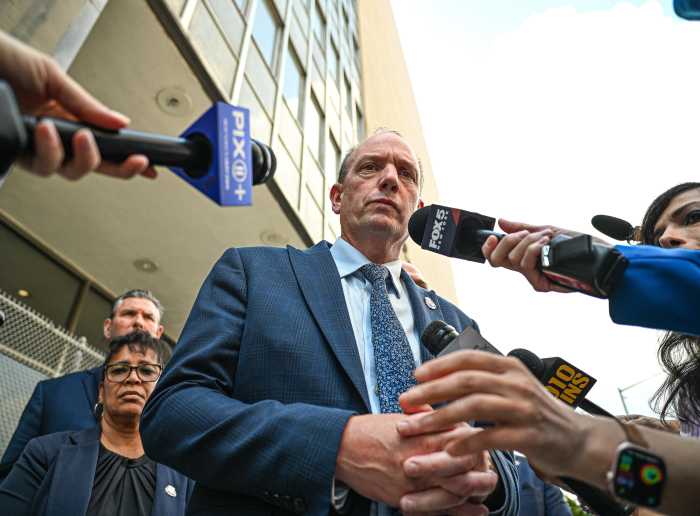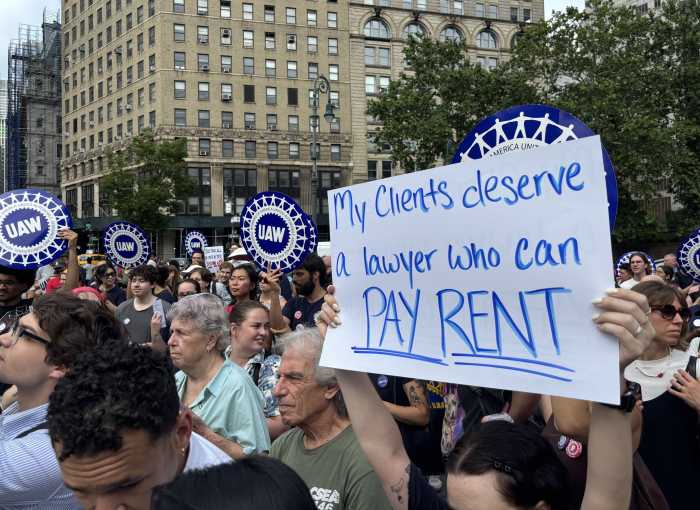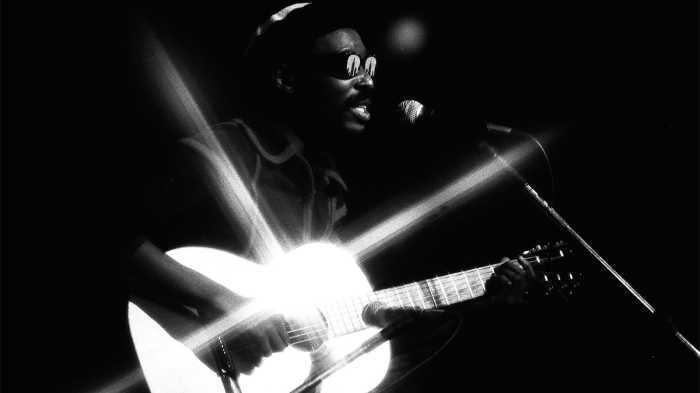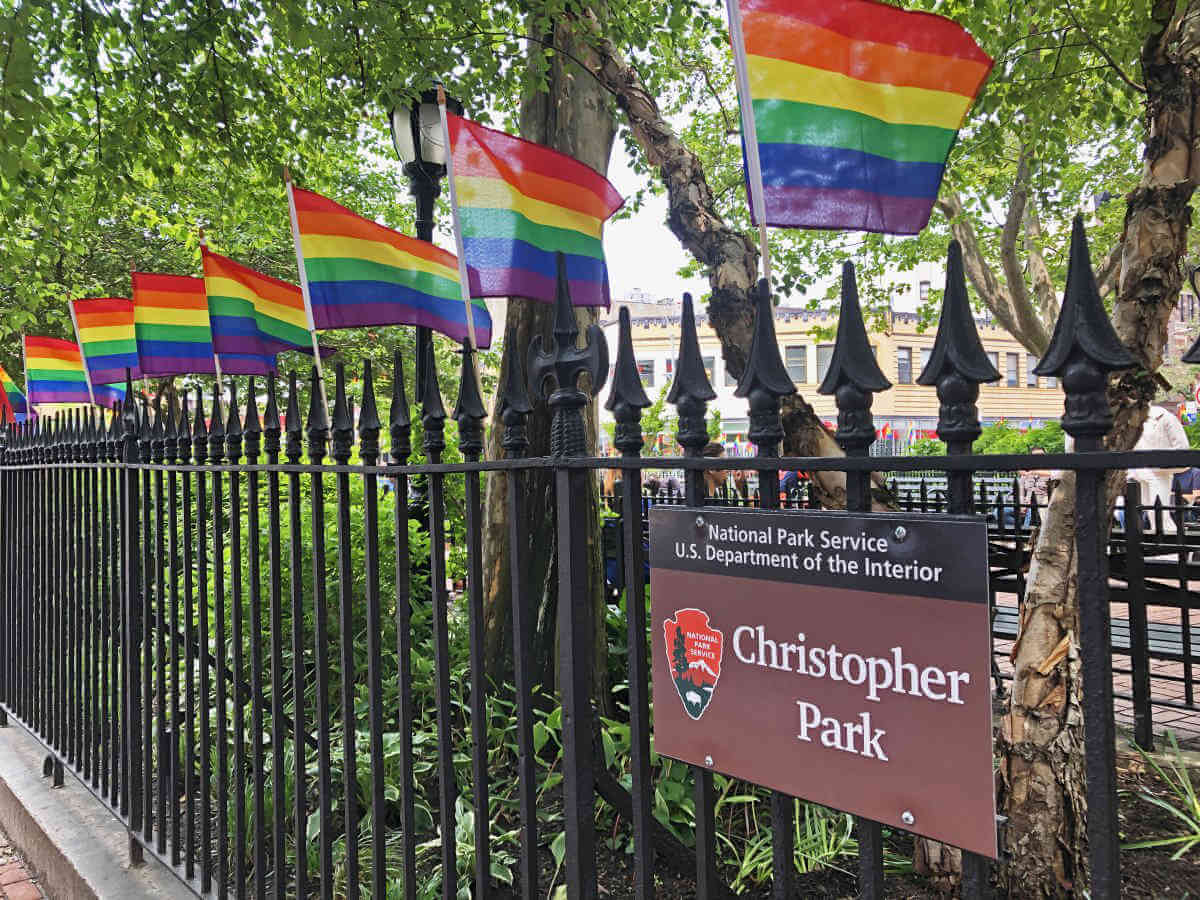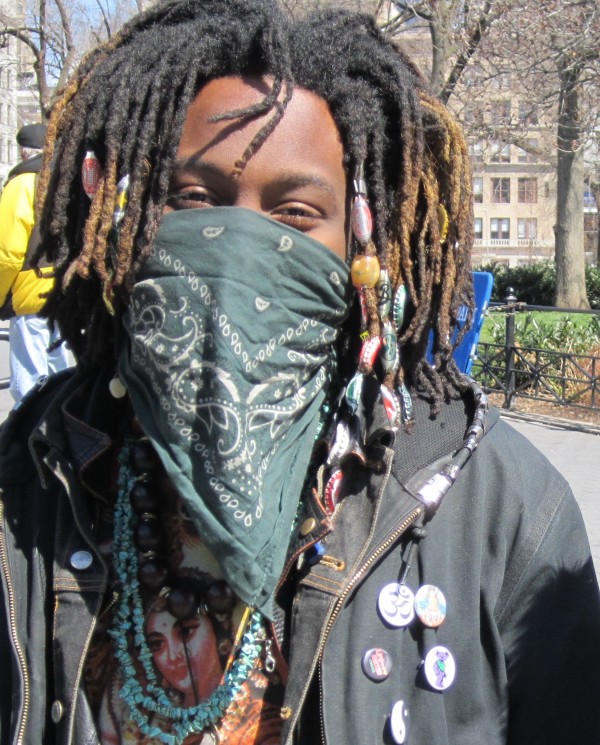
BY LINCOLN ANDERSON
| They hadn’t yet read Chad Marlow’s controversial “A crusty proposal” talking point in last week’s Villager. But a group that the outspoken Community Board 3 member would deride as the “voluntary homeless” in Union Square Tuesday morning shrugged off his blistering critiques and defended their freewheeling lifestyle.
About a half dozen youths in their late teens and 20s, they were huddled together in the lee of the Union Square subway kiosk in the park’s southwestern corner. Some were slouched on the ground, partially covered by down sleeping bags in the unseasonably cold and windy weather. Others sat cross-legged on the pavement nearby. A hash pipe was passed and one of them sparked it with a lighter as his friend took a hit, and the smell of pot wafted into the brisk air.
Told of Marlow’s premise, that there are voluntary homeless and involuntary homeless, namely the travelers — or crusties, as many call them — and that the latter should not be allowed to sleep on the city’s sidewalks or in its parks at night, they were dismissive, indignant.
“Who is this guy?” asked Tre, 18, the most garrulous of the bunch, of Marlow, after exhaling the toke. From Baltimore originally, he sported dreadlocks with an array of colorful beer bottle caps bent around them.
He said Marlow’s main point is fundamentally flawed, since, “Most of the time, you start out as a voluntary traveler — and you become an involuntary traveler.”
Plus, one of them named Sid offered, “If you’re going to be homeless, why not use your homelessness and travel?”
Actually, this group of travelers — none used the word “crusty” to describe themselves — didn’t seem to have done too much traveling lately.
“I’m new!” said one woman from Atlanta, raising her hand, but she was the exception.
Tre (pronounced “tray”) said he has been living in the city about a year. So had Julia, 20, though she said she was planning to hitchhike to California in two months. The two might possibly be off the hook under Marlow’s proposal — but only if they’ve lived in the city, including on the streets, without a break for 12 consecutive months.
“We’ve been here all winter,” Tre said, noting they “moved around” to different spots.
Other names they’re known by include “gutter punks” and “fauxbos,” as in “fake hobos,” as people call them in New Orleans.
Marlow’s talking point also recommends that the travelers’ frequent companions, their dogs, if unlicensed, should be seized and taken to an animal shelter.
But Tre argued the dogs are better off living out on the streets than cooped up alone and neglected indoors.
“It’s better for the animals,” he asserted. “We spend all of our time with our animals. It’s better for their social interaction.”
None of them had dogs, but one woman, who didn’t give her name, had a brown rat, which poked its head up out of the neck of her zipper hoodie for a moment and looked around, before scurrying back inside out of the wind.
“It’s easier size-wise” than a dog, she noted of the rodent. “And it’s easier to walk.”
How about another of the C.B. 3 member’s barbs: that panhandling crusties are competing with the very people who most need the handouts, the involuntary homeless.
“We all have the same needs,” objected one man with a wispy brown beard.
They simply like their lives, like being free, they said. Traveling is “an American tradition,” Tre added.
“Woody Guthrie wrote about traveling and riding the trains,” he said. “It’s a music tradition. You ever heard that song about ‘Big Rock Candy Mountain’? It’s about traveling,” he said, singing a verse from the classic hobo ballad, about “railroad bulls” and “cigarette trees.”
“There’s a reason why alternative lifestyles exist — and will always exist,” he said. “People can’t just be like zombies.”
What about Marlow’s main point, and the real impetus behind his column — that the travelers seem to have gotten more violent and destructive in recent years? Marlow said that The Villager’s coverage of several incidents last summer influenced his thinking, including crusties’ graffitiing profanities on St. Mark’s Church and a crusty menacing a senior in Washington Square Park and breaking the older man’s sunglasses after he complained about the traveler’s pit bull peeing in the fountain.
“Everybody’s violent,” Tre observed. “Home bums are violent,” he said of travelers who don’t travel anymore but remain homeless. “Rich kids from New Jersey are violent. It sucks.”
A homeless man named Smoke, 34, who knows them walked up to say hello. He’s not a traveler, but a native New Yorker — so, under Marlow’s proposal, could legally sleep on the street at night. Asked about the distinction between voluntary and involuntary homeless, Smoke wasn’t sold.
“I feel personally that travelers are the same [as the native homeless],” he said. “It don’t matter where you’re from — it matters where you’re at. We go through the same things: It’s hard to get food; it’s hard to get money for carfare.”
Julia became homeless at 15, after leaving an abusive home in New Jersey. Small and pretty with two silver lip piercings, she was shivering in a camouflage cap, turquoise hoodie and flannel pajama bottoms.
“I think traveling is something everyone should do,” she said. “You just try to meet and greet, and basically tell people your story.” She used to be very shy, but traveling has made her much more outgoing, she said.
She’s even visited the famed favelas (shanty towns) in Rio de Janeiro.
Jamie, 18, from the Upper East Side, and Julia met in Union Square. Asian, with tattooed forearms, he plans to go with her to California. Giving her a hug, he said, “I want to travel with her. When you’re at a young age, you want to find who you are in life. I want to see how beautiful the world is, I want to understand it.”
As for the homeless youths’ well-documented substance abuse problems, Julia said, “I know a lot of street kids who are under the influence due to depression, because it’s not always easy to live outside.” However, she added she keeps clean — both physically and in terms of substances. “It’s a myth that all travelers are on drugs,” she maintained.
Like her friends, she said, they have a right to defend themselves. She has to be on guard for “creepers” who might approach her when she’s sleeping outside.
“I look young, younger than I am,” she noted. “People think I’m jailbait. I find that disrespectful. What am I supposed to do — get raped again?
“A lot of stuff happens out here,” she said matter of factly.
There’s one frequent criticism the travelers find especially irritating: Because some have cell phones, people don’t believe they’re really needy. But they noted it’s easy to get a free cell phone, and minutes can be paid for with food stamps. Also, their parents might want them to have one so they can stay in touch.
“There’s a big difference between a cell phone and finding rent every month,” Tre explained. “I have a family I have to call. People all say, ‘Get a job.’ How can I get a job without a phone?”
Although they’re proud of their lifestyle, most of them were uncomfortable posing for a photo. Tre and Sid eventually agreed, but only after pulling up their bandannas to hide their faces.
During the hourlong interview, none of the travelers expressed any violence. However, at one point, Smoke, the homeless native New Yorker, came back around. He announced that a certain guy who really annoys him better not come by, or he would mess him up.




